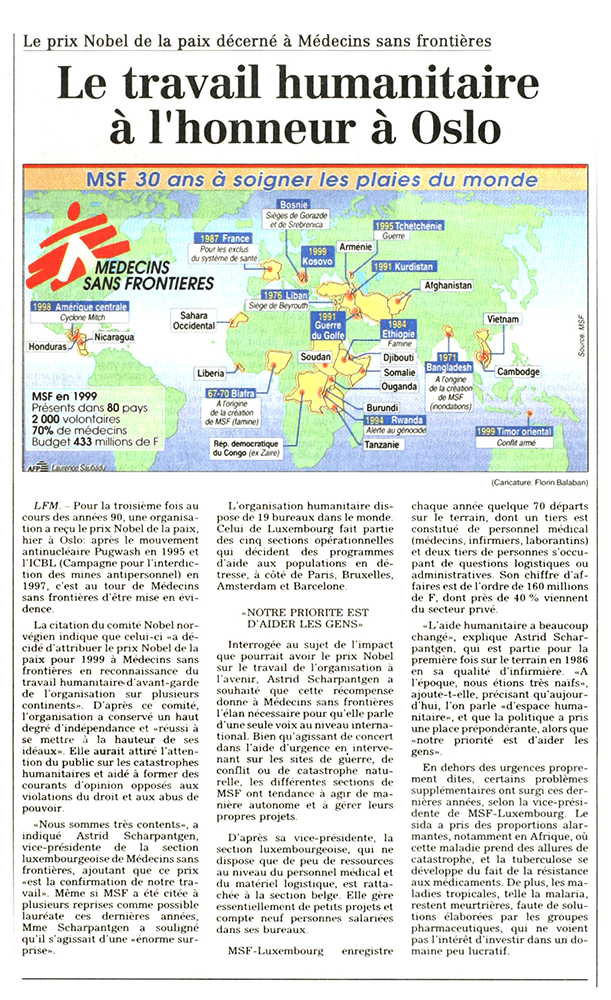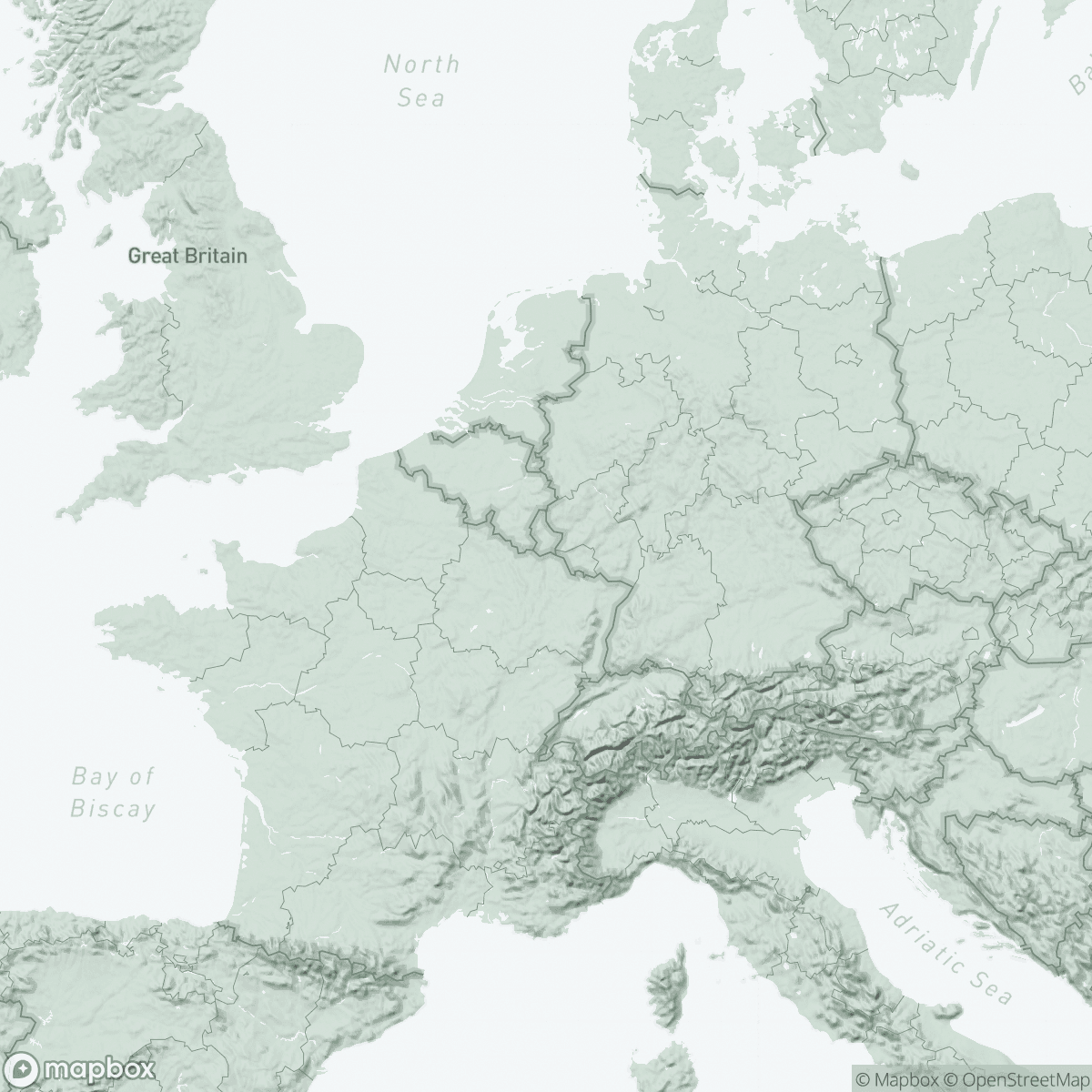
"Silence has often been confused with neutrality"
In 1 click, help us spread this information :
25 years after receiving the Nobel Peace Prize, Médecins Sans Frontières (MSF) is witnessing the failure of the international community to protect civilians and prevent violations of international humanitarian law.
The Luxembourg section of MSF marks this anniversary by sharing the memories and feelings of those who lived through this historic moment, by comparing yesterday’s challenges with those of today.
On December 10, 1999, James Orbinski, international president of Médecins Sans Frontières (MSF), accepted the Nobel Peace Prize awarded to the organization in Oslo, Norway. In his speech he denounced the indiscriminate bombings that the Russian army had been carrying out for months against the civilian population in Chechnya and in particular in Grozny.
Today, 25 years later, the observation of the time has unfortunately not changed: the international community still fails to protect civilians and to defend international humanitarian law.
If conflicts and wars are matters of state, violations of humanitarian law, war crimes and crimes against humanity concern each and every one of us".
James Orbinski, Oslo, 1999.
The Nobel Prize, an “encouragement to continue”
"This prize is a recognition of the work of the last 30 years, accomplished by thousands of people who have volunteered. And it is certainly an encouragement to continue," confided Dr Romain Poos, then President of MSF Luxembourg, during an interview given to RTL on October 15, 1999.
We usually intervene where politics has failed, a warning signal that highlights a situation to make politics react. But most of the time, politics is quite powerless in the face of the situation."
Dr Romain Poos, then President of MSF Luxembourg, 1999
And I think that this also represents an obligation for us to continue to ensure a high quality of work in the future,” he continued, before adding:
"We were all proud on October 15, 1999, when around 11 a.m. the news broke: MSF would receive the last Nobel Peace Prize of the century."
For Astrid Scharpantgen, then Vice-President of the Luxembourg section, this prize is an opportunity to scratch a still-open wound: asked at the time about the impact that the Nobel could have on the work of the organisation, Astrid wished:
that this award gives Médecins Sans Frontières the necessary impetus to speak with one voice at the international level.”
Astrid Scharpantgen, alors Vice-presidente of MSF Luxembourg, 1999

Astrid Scharpantgen and Dr Rony Zachariah, former Director of the Luxembourg Operational Research Unit (LuxOR) and currently an associate member of MSF Luxembourg, had the honour of representing the section at the presentation of the prestigious award on 10 December in Oslo.
"A question of humanity"
“I had the privilege of being among those who went to receive it [the Nobel Prize] on behalf of MSF. It was a humbling moment. But also a moment of international recognition, when I look back on it 25 years later, I think that MSF has never been about prizes or accolades. It is about humanity,” Zachariah recalls.
“As MSF, we must never hesitate to be the heart and voice of the people who are suffering. We must also never ignore the voices of our own MSF staff who are facing unimaginable suffering. They are witnesses to it, especially today, for example, in circumstances of genocide. We have seen a lot of it, and we have seen Yugoslavia. And now what is happening in Gaza. MSF must take a stand on these issues.
It is not about taking a political position. MSF's political neutrality is never equal to neutrality of conscience."
Dr Rony Zachariah, ex Director of LuxOR, 2024
Sonia Couprie, actuellement Coordinatrice de LuxOR, se souvient clairement de ce moment historique : « Il y a 25 ans, mon mari et moi travaillions tous les deux au bureau de coordination de MSF en Indonésie. C’est d’ailleurs Marie-Eve, la cheffe de mission, qui est allée recevoir le prix à Oslo au nom de MSF. Je me souviens du sentiment de joie mêlé de fierté qui nous a submergés. C’était au mois d’octobre. Quelques jours après, ma sœur se mariait.
Sonia Couprie, currently Coordinator of LuxOR, remembers this historic moment clearly: “25 years ago, my husband and I were both working in the MSF coordination office in Indonesia. It was Marie-Eve, the head of mission, who went to receive the award in Oslo on behalf of MSF. I remember the feeling of joy mixed with pride that overwhelmed us. It was in October. A few days later, my sister was getting married.
In his speech, my father was particularly happy to be able to announce that there were three Nobel Prize winners in the room that day, the two of us and my older sister, who was then a member of the MSF Board of Directors".
Sonia Couprie, Coordinator of LuxOR, 2024
25 years later, “humanitarian responsibility still has no borders”
Today, and with the perspective of time, Sonia Couprie acknowledges that “MSF has changed a lot since then, particularly in size, which sometimes makes it a little less ‘flexible’.”
“However, another change is moving MSF in the right direction: the greater diversification within MSF teams, particularly in the field. Finally, the program that was created thanks to the Nobel Prize (Access Campaign) has made it possible to make considerable progress in terms of perception, policies and practices regarding access to essential medicines and MSF has been an undisputed leader in this approach, which I admire,” she adds.
"The continuing failure to protect civilians"
25 years after the Nobel Prize was awarded, conflicts are becoming more frequent and their consequences more devastating for the population. According to the Institute for Economics and Peace (IEP), the number of conflicts has reached its highest level since the Second World War, with 56 wars and 92 countries involved.
Today, attacks on healthcare are at historic highs. According to the Coalition for Protecting Health in Conflict, 2023 marked the largest global increase in attacks on healthcare ever recorded, with more than 2,500 incidents. Since 2015, MSF has lost at least 32 of its workers in direct attacks on its facilities.
[Humanitarian law] establishes the rights of victims and humanitarian organizations and determines the responsibility of States to ensure respect for these rights and to punish their violation as war crimes. Today, this framework is clearly dysfunctional,”
James Orbinski, Oslo, 1999.
Humanitarian assistance is increasingly becoming a casualty of conflict, with devastating consequences for the civilian population. Unfortunately, we are witnessing a profound erosion of the protection of health care and of the very principle of distinction between civilians and combatants every day.
“Express yourself where it matters most”
Dr Rony Zachariah: “MSF’s position today is very clear about what we need to do. We cannot remain silent when we see atrocities against human beings and, especially, when we see states being silent, and especially when unbelievable crimes against humanity are being committed.
Today, more than ever, MSF must ensure that there is no conflict of interest, and that it is not on the wrong side of history.
More than ever, we need to be transparent and reaffirm our identity. We need to work to earn the trust of the people watching us. “25 years later, we need to be able to speak up where it matters most. We need to act to defend human dignity, wherever it may be found.”
And if we stopped doing that, I think we would start to betray who we really are. And the very reason MSF was created."
Dr Rony Zachariah, ex Director of LuxOR, 2024

